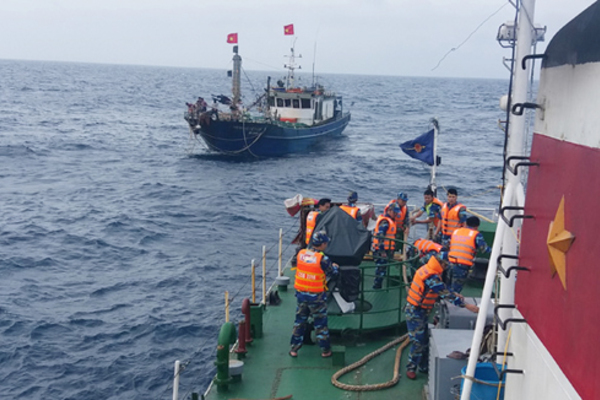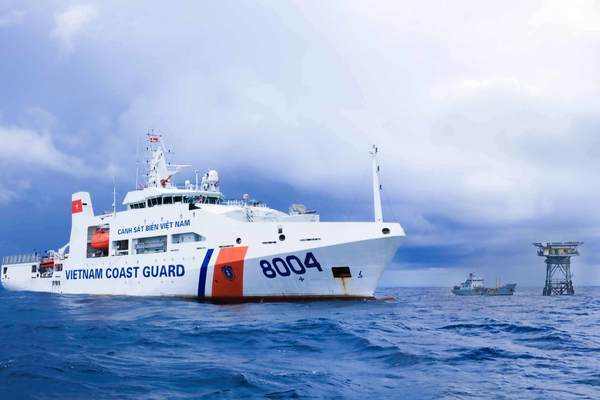The Vietnam Coast Guard is the force that directly implements the international treaties to which Vietnam is a signatory. According to the provisions of the international treaties to which Vietnam is a signatory: the United Nations Convention on the Law of the Sea 1982; Convention on the safety of life at sea in 1974, which was amended and supplemented in 1978 - SOLAS 1974; Convention on the Prevention of Illegal Acts Against Maritime Safety (SUA 88) and Protocol on the Prevention of Illegal Acts Against Maritime Safety in Continental Shelf Fixed Rigs; 1979 Maritime Search and Rescue Convention (SAR 1979); Regional Cooperation Agreement on Anti-piracy and Armed robbery against ships in Asia; Vietnam - China Agreement on Fisheries Cooperation... the Vietnam Coast Guard, after fully implementing the regulations on reporting and applying for permits, has the right to operate outside Vietnamese waters.
 |
|
The Coast Guard has the right to operate outside Vietnamese waters
|
Vietnam is a country located in the southeastern tip of the Indochinese peninsula, with a coastline of 3,260 km excluding islands. In addition to the internal waters, Vietnam claims 12 nautical miles of territorial waters, an additional 12 nautical miles of contiguous territorial sea, 200 nautical miles of exclusive economic zone and finally continental shelf. The sea area under the sovereignty, sovereignty right and jurisdiction of Vietnam occupies an area of about 1,000,000 km² in the East Sea.
However, the fact has shown that there are the waters (Gulf of Tonkin, the historic waters of Vietnam - Cambodia) that the baselines, internal waters, territorial water have not been defined, so there is no basis to divide the scope of activity for each force. Moreover, Vietnam's water is wide, difficult to control, manage and defend, in which the southern sea area with internal waters of 80-100 nautical miles (from Hon Hai to Con Dao, Tho Chu) is an important water with many resources that need to be protected, and having many fishing activities at the same time, where many illegal acts such as smuggling, trade fraud, foreign ships encroaching on Vietnam’s waters, illegal exploitation of marine resources, armed robbery at sea recorded.
Meanwhile, other functional forces operating at sea are still small in scale and limited in facilities, equipment and operational capacity. If the scope of operations in each sea area is divided among forces, it will easily lead to gaps in management over the sea, resulted in more violation, crime at sea, wasting resources the Party and State have invested in the Vietnam Coast Guard, restricting the promotion of the combined strength of forces in building defense and security positions at sea and management and protection of the country’s sea and islands; ensuring similarity in the operational scope between the Vietnam Coast Guard and the coastal protection forces of other countries.
 |
|
The Law on Vietnam Coast Guard took effect on July 1, 2019. This is a law of special importance, specifying the activities of the Vietnam Coast Guard.
|
At present, the violations of criminal law and administrative law occurring at sea are closely related to the areas outside Vietnam's territorial waters (on land, international waters, other national waters). The relationship can come from subjects, offices, warehouses, exhibits, documents ... especially organized crimes, transnational crimes related to the illegal purchase, sale and transport of weapons , terrorism, drugs, human trafficking, smuggling, trade fraud at sea ...
Therefore, Clause 2, Article 11 of the Law on Vietnam Coast Guard clearly states: “In the case of peaceful and humanitarian purposes, fight against crime and violation of the law, the Vietnam Coast Guard is allowed to operate out of Vietnamese waters.” This is a new point about the scope of operations of the Vietnam Coast Guard, which is defined in the Law as operating outside Vietnamese waters. The phrase "outside Vietnamese waters" can be understood to include: relevant geographical areas and waters outside Vietnam's territorial waters (mainland, international waters).
Article 12 of the Law on Vietnam Coast Guard clearly specifies 07 working measures for the Coast Guard, including: mass mobilization, law, diplomacy, economics, science - technology, profession, and armed forces to defend national security, ensuring order and safety at sea according to the provisions of law; The Commander of the Vietnam Coast Guard decides on the use of working measures of the Coast Guard, and is responsible before the law and his superiors for his decision.
The provisions of Article 12 of the Law on Vietnam Coast Guard create the legal basis for the Vietnam Coast Guard to well perform its assigned functions, tasks and powers; showing its correct position and role as the people's armed force, the State's specialized force, acting as the core of law enforcement at sea.
This is a new and clearer regulation compared to the 2008 Ordinance; overcoming the shortcomings of the current legal system that do not yet have regulations on working measures for the Coast Guard.
The Law on Vietnam Coast Guard also stipulates more clearly the international cooperation of the Vietnam Coast Guard, with a separate section, including three articles on principles, contents and forms of international cooperation to create legal corridors and favorable conditions for the Vietnam Coast Guard to fulfill national liabilities in accordance with the provisions of the international treaties to which Vietnam is a signatory.
Hai Van